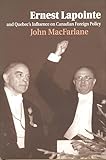Ernest Lapointe and Quebec's Influence on Canada's Foreign Policy / John MacFarlane.
Material type: TextPublisher: Toronto : University of Toronto Press, [1999]Copyright date: ©1999Description: 1 online resource (288 p.)Content type:
TextPublisher: Toronto : University of Toronto Press, [1999]Copyright date: ©1999Description: 1 online resource (288 p.)Content type: - 9780802044877
- 9781442674585
- 328.71/092 B 21
- F1034.L34 M33 1999
- online - DeGruyter
| Item type | Current library | Call number | URL | Status | Notes | Barcode | |
|---|---|---|---|---|---|---|---|
 eBook
eBook
|
Biblioteca "Angelicum" Pont. Univ. S.Tommaso d'Aquino Nuvola online | online - DeGruyter (Browse shelf(Opens below)) | Online access | Not for loan (Accesso limitato) | Accesso per gli utenti autorizzati / Access for authorized users | (dgr)9781442674585 |
restricted access online access with authorization star
http://purl.org/coar/access_right/c_16ec
Currently the stakes are higher than ever for anglophone Canada to recognize and understand the extent and nature of Quebec's role in the shaping of the nation. John MacFarlane's revision of anglophone history is a compelling step in that process.Historians often emphasize how, during both the difficult inter-war years and the Second World War, the Liberal government of Mackenzie King successfully reconciled the needs of majority rule with the recognition of minority voice, particularly in foreign affairs. How did a consummate anti-Catholic, who did not even speak French, manage to acknowledge and accommodate the vastly different demands of the French-speaking population? Issues such as conscription, relations with Great Britain, and Canadian policy at the League of Nations threatened to divide Canada when the instability of the international scene urgently required a unified voice. Ernest Lapointe, officially the minister of justice (1924-5, 1926-30, 1935-41) and minister of fisheries (1921-4), represented francophone Quebeckers in the federal cabinet. His ability to influence and reflect the views of the Quebec population, his loyalty to Mackenzie King, and in some cases, his threats of resignation, awarded him considerable weight in many external affairs questions. Yet his influence, as a major figure of twentieth century Canadian political history, is one of the least understood. Analysing seventeen foreign policy decisions, the author uncovers Ernest Lapointe's relationship with King, and the voice of Quebec represented by his skilful interceptions.
Mode of access: Internet via World Wide Web.
In English.
Description based on online resource; title from PDF title page (publisher's Web site, viewed 01. Nov 2023)


